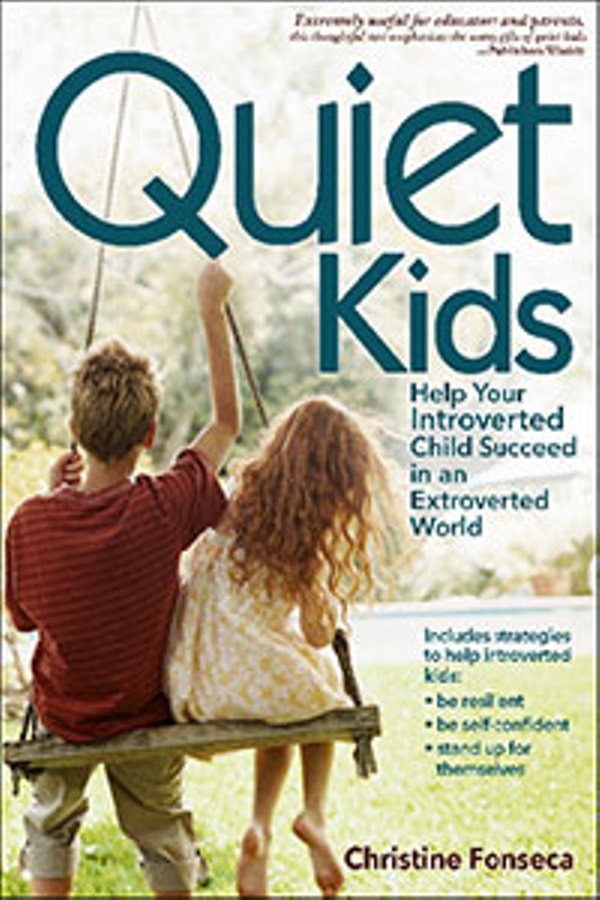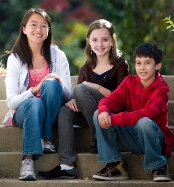
|
|
|
|
Featured
Topic | Resources |
In the News |
Gifted News |
Davidson News
|
Closing Thought
|
|
Featured
Topic -
Introverted Gifted Students
|
| |
We hope everyone is having
a great start to their school year!
On the spectrum of
introverts and extroverts, temperment can greatly impact how students
interact in a classroom setting. Past research indicates that anywhere from one-third to one-half of the
general population are introverts, with this percentage increasing
to
more than half in profoundly gifted population.
In this issue, we are providing information about
introverts to assist educators working with gifted students
who exhibit this temperament.
 Guest
Q&A Guest
Q&A
Critically acclaimed and award-winning author,
Christine Fonseca is an educational psychologist dedicated to helping
children and adults find their unique voice in the world.
Her books delve into the world of giftedness, resiliency
and temperament, with titles that include:
101
Success Secrets for Gifted Kids
The Girl Guide: Finding Your Place in a Mixed-Up World
To read the full Q&A text, click here as the following version has been edited.
How
does being an introvert or an extrovert impact students’
behavior at school or in the classroom?
These temperaments refer to more than just
behavior. It refers to the way a child processes energy,
renews at the end of the day, interacts with the world and
even learns. Introverts require solitude and a calm
environment, while extroverts thrive in the social
excitement that typically occurs on a school campus. In
learning, the introverted child prefers to think about
information before outwardly engaging with the material, and enjoys
learning a lot about a few topics . . . Extroverts, on the other
hand, often process information quickly and may appear
impulsive in class. They like a survey-approach to learning
and require significant stimulation throughout the day.
The introvert may appear hesitant in class,
“shy” or aloof. He or she may get agitated in a noisy
classroom or during loud assemblies while the extrovert is
often socially engaged and will thrive when things are busy.
Read More...
How are giftedness and temperament related, and what do teachers need to know about this topic?

. . .
The
gifted child may be either introverted or extroverted. Research
and my own experience suggest that introversion occurs at a
significantly higher rate among gifted individuals. This prevalence of
introversion can further alienate
gifted individuals in the typical classroom setting. In a typical classroom,
this may be interpreted as not understanding the material.
Introverts tend to pour themselves into their
passions and are reluctant to transition away from preferred
activities . . . Teachers can allow students a longer wait time than is typical. Do not pre-judge
the reserved or cautious nature of a student as indicative
of a problem with social skills or lack of motivation. It
could be you are just dealing with introversion and perhaps
even a gifted introvert. Read more...How can educators support
introverted students?
There are a number of
ways a teacher can support introverted learners. First,
create a balanced environment—one that allows for a mix of
group and individual activities, and one that enables
movement for the extrovert and periods of rest and calm for
the introvert. Next, create safe zones for introverts,
such as the library or a staff member's office, that they can use for respite during the day. Focus on teaching social skills like asking for help
and initiating conversations within your classroom as
well as embedding social competencies (problem solving and
anger management) into your curriculum. Finally, create a
culture of caring for all students by openly talking about
temperament and learning style. Read More...
In terms
of peer relations, is there anything that teachers can
do to assist introverted students?
Relationships with peers are tricky for gifted
children in general. Add the aspect of introversion and
it is easy to understand why friendships are such a
large area of concern for educators and parents alike.
Fortunately, there are many things teachers can do to
support gifted introverts. Such as,
understanding the differences between shyness and
introversion . . . To help with developing social connections, focus on
teaching social skills like conversation initiation, and
problem solving and, pair introverted children with
similar interests together. Finally, encourage
introverted children to use their safe zones during
lunch or recess, and bring a friend along. Read more...
What are
some commonly asked questions by educators regarding
introverted, gifted students (and your responses)?
I get many questions regarding
teaching introverts and encouraging participation without
draining their energy. My advice, allow introverted children
to learn through a balance of group and individual projects.
Furthermore, allow introverted students an opportunity to
study areas of interest at a deeper level. These
considerations, as well as the previously mentioned
suggestions, can support the wide variety of learners in a
typical class, including the introvert and the gifted
introvert. Read more... A more thorough discussion of temperament, introversion and
supporting both introverted and gifted learners can be found
in Christine’s books listed above as well as her upcoming
new release
Raising the Shy Child: A Parent’s Guide to Social Anxiety
(Prufrock
Press, March 2015).
|
|
|
|
Resources
|
| |
Chapter 11, Quiet: The Power of
Introverts in a World That Can't Stop Talking
Quiet: The
Power of Introverts in a World That Can’t Stop Talking by Susan Cain
contains a section in Chapter 11 discussing how teachers can work with
introverted students. The author
provides a detailed list (p. 255 and 256), which has been summarized
below. Please refer to the complete list in Quiet for additional
strategies
on how to assist introverted students.
by Susan Cain
contains a section in Chapter 11 discussing how teachers can work with
introverted students. The author
provides a detailed list (p. 255 and 256), which has been summarized
below. Please refer to the complete list in Quiet for additional
strategies
on how to assist introverted students.
- Don’t seat quiet kids in the
“high interaction” areas of the classroom . . . they will feel
more threatened and have trouble concentrating.
- Don’t think of introversion as
something that needs to be cured . . . Pat Adams, former head of the Emerson School for gifted
students in Michigan is quoted “. . . We think about introverted kids as
having a different learning style.”
- Introverts often have one or two deep
interests not shared by their peers . . . studies show this sort of
intensity is a prerequisite for talent development.
- Balance teaching methods to serve all students,
for example extroverts like movement, stimulation and collaborative work
while introverts prefer lectures, downtime and independent projects.
Some collaborative work is
fine for introverts, even beneficial, but in small groups –
pairs or threesomes – and carefully structured so each student knows their
role. Teach all students to work
independently – extroverts and introverts.
- If your school has a selective admissions
policy based on student’s performance in a play group, know that many
introverted kids clam up in groups of strangers.
On the Quiet website there is a free
Teacher's Guide that can be used in a variety of academic disciplines to
accompany the book, and provide greater insight into the interaction between the
two temperament styles: extroversion and introversion.
Other Books
Articles
|
|
|
|
In
the News
|
|
|
|
Gifted News
|
|
Now Available - Dr.
Jim Delisle's New Book Dumbing Down America
At a time when the U.S. education system
consistently lags behind its international
peers, Dr. Jim Delisle's new book,
Dumbing Down America, is filled with specific examples of how gifted
children are being shortchanged by a nation that believes
smart kids will succeed on their own. This book packs a
powerful message: If we want our nation to prosper, we must
pay attention to its most intelligent youth. Available now from
Prufrock Press, you can order your copy today. Plus, read this
recent interview with Dr. Delisle on the Gifted Parenting Support blog.
Largest Undergraduate Scholarship in the Nation Available to High-Achieving, Low-Income Students
 The
Jack Kent Cooke Foundation is accepting applications for its
College Scholarship Program, the largest undergraduate
scholarship in the country. Recipients will be awarded as
much as $40,000 per year for four years for tuition, books,
living expenses and other required fees. Up to 40 spaces are
available to high-achieving high school seniors with
financial need who seek to attend the nation’s best
four-year colleges and universities.
The application period will
close on November 4, 2014. For eligibility
details, click here. The
Jack Kent Cooke Foundation is accepting applications for its
College Scholarship Program, the largest undergraduate
scholarship in the country. Recipients will be awarded as
much as $40,000 per year for four years for tuition, books,
living expenses and other required fees. Up to 40 spaces are
available to high-achieving high school seniors with
financial need who seek to attend the nation’s best
four-year colleges and universities.
The application period will
close on November 4, 2014. For eligibility
details, click here.
National Association for Gifted Children Launches Redesigned
Website
The National Association for Gifted Children (NAGC) recently
launched a redesign of their website. The new
site was created with various audiences in mind, such as
educators,
parents, administrators, college and
 university
faculty, elected officials and reporters. With the enhanced
design and navigation, users can easily search and find
updated information on a number of issues. The Information
and Publications
section
contains a wealth of resources, including a link to the NAGC
Gifted and Talented Resources Directory
and
Gifted by State
data. Much of this information results from the work done on
behalf of NAGC members to keep the need for quality programs
and services for high-ability learners front and center.
university
faculty, elected officials and reporters. With the enhanced
design and navigation, users can easily search and find
updated information on a number of issues. The Information
and Publications
section
contains a wealth of resources, including a link to the NAGC
Gifted and Talented Resources Directory
and
Gifted by State
data. Much of this information results from the work done on
behalf of NAGC members to keep the need for quality programs
and services for high-ability learners front and center.
| |
|
|
Davidson
News
|

2014 Davidson Fellows Announced
The Davidson Institute announces the 2014 Davidson Fellows!
These 20 extraordinary young people, all 18 years old or
younger, have completed
graduate-level work in their various fields of study,
including science, technology, engineering, mathematics,
music, literature, philosophy and outside the box, to earn
$50,000, $25,000 and $10,000 scholarships. Since 2001, more
than $5.8 million has been awarded to 246 Davidson Fellows.
To read more about these amazing young people and their
project descriptions, visit the
Meet the
Davidson Fellows.
Scholarship eligibility and application information can be
found on the Davidson Fellows
How to Apply page.
Davidson Academy Application Now Available for 2015-2016
The Davidson Academy of Nevada, a free
public day school for profoundly gifted pupils on the
University of Nevada, Reno campus, is now accepting
applications for the 2015-2016 school year.
Application materials can be downloaded at www.DavidsonAcademy.UNR.edu.
Applications are reviewed on a monthly basis with a final
deadline of April 1, 2015. The Davidson Academy is hosting
tours on
Sept. 26,
Oct. 24,
Nov. 21
and
Dec. 12.
These tours provide an opportunity for prospective students
and their families to visit the school and meet instructors,
staff and current Academy students. An RSVP is
required. Please click
here for more information and to RSVP.
Educators Guild
Facebook
All educators, and people interested in gifted education, are invited to join
the
Educators Guild Discussion Group on Facebook and contribute to the ongoing conversation about how to best serve the academic needs of our nation’s  brightest
students. brightest
students.
|
|
|
Closing Thought
|
| |
"It is so easy to conclude . . . that the quiet child at the back of the classroom is not interested in what is being said, or distracted, or unable to concentrate, or slow to respond, when in fact she is simply reflecting, thinking things over and making all the wonderful connections we hope for."
~ Dr. Trevor Tebbs in the Psychology Today article,
Close to Tragic: Unconsidered Personality
|
|
|
|
If you have information to include in future
Educators Guild Newsletters, please email our EdGuild@DavidsonGifted.org.
If you have been forwarded this newsletter, and wish to receive future editions,
sign-up here |
|
Davidson Institute for Talent Development
Supporting our nation's brightest young minds.
9665 Gateway Drive, Suite B, Reno, Nevada 89521
Phone: 775-852-3483 Fax: 775-852-2184
Email: EdGuild@davidsongifted.org Web: www.DavidsonGifted.org
www.DavidsonGifted.org/EdGuild.
NOTE: The appearance of selected programs and/or resources in the Davidson Institute's Educators Guild Newsletter
does not imply an endorsement or affiliation. Programs and resources are highlighted for informational purposes only.
Visit the Davidson Institute's
Educators Guild Newsletter archive page.



"Like"
the Davidson Institute on
Facebook
and follow us on
Twitter.
The Davidson Institute also has a number of
YouTube videos!
|



 by
by 



